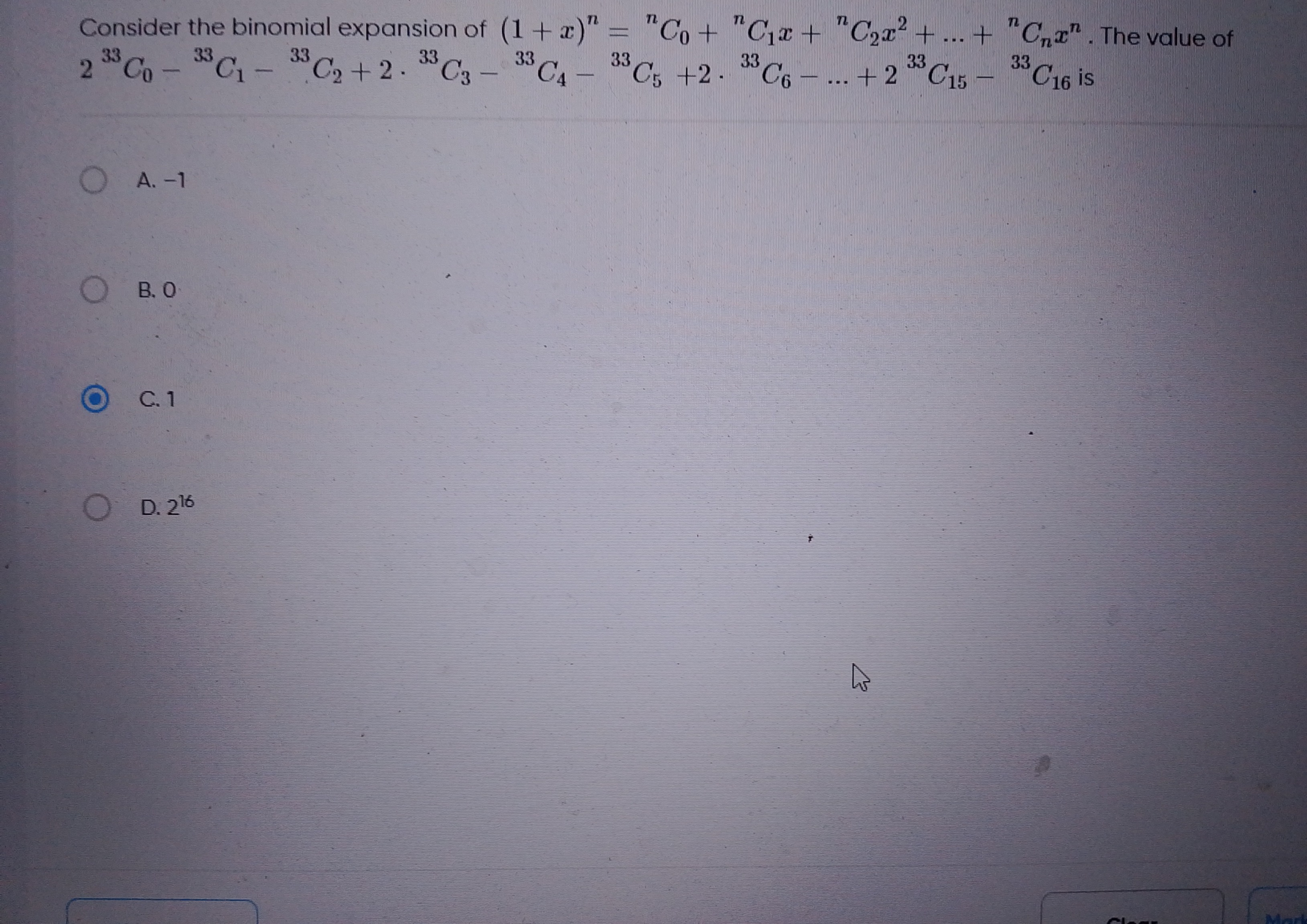Question
Question: Consider the binomial expansion of $(1+x)^n = ^nC_0 + ^nC_1x + ^nC_2x^2 + ... + ^nC_nx^n$. The value...
Consider the binomial expansion of (1+x)n=nC0+nC1x+nC2x2+...+nCnxn. The value of 2⋅33C0−33C1−33C2+2⋅33C3−33C4−33C5+2⋅33C6−...+2⋅33C15−33C16 is

-1
0
1
216
-1
Solution
Let the given sum be S.
The general term in the sum follows a pattern of coefficients: 2,−1,−1 for Cr where r(mod3) is 0,1,2 respectively.
The sum can be written as:
S=(2⋅33C0−33C1−33C2)+(2⋅33C3−33C4−33C5)+⋯+(2⋅33C12−33C13−33C14)+2⋅33C15−33C16
This sum can be written as:
S=∑k=04(2⋅33C3k−33C3k+1−33C3k+2)+2⋅33C15−33C16
However, the term 2⋅33C15 is already part of the sum 2⋅33C3k for k=5.
So, let's rewrite the sum by carefully observing the last term.
The last term is 33C16.
The pattern 2,−1,−1 applies to terms C3k,C3k+1,C3k+2.
The sum goes up to C16.
16≡1(mod3).
So, the term C16 has coefficient −1.
The term C15 (since 15≡0(mod3)) has coefficient 2.
The term C14 (since 14≡2(mod3)) has coefficient −1.
The sum is:
S=(2C0−C1−C2)+(2C3−C4−C5)+(2C6−C7−C8)+(2C9−C10−C11)+(2C12−C13−C14)+2C15−C16.
Let's define a function f(r) such that f(r)=2 if r≡0(mod3), and f(r)=−1 if r≡1(mod3) or r≡2(mod3).
The given sum is ∑r=016f(r)33Cr.
Consider the properties of cube roots of unity. Let ω=ei2π/3. We know 1+ω+ω2=0.
Consider the sum T=∑r=0nnCrxr.
We are interested in a sum of the form ∑r=0nkrnCr.
Let's find a,b,c such that kr=a+bωr+cω2r.
If r≡0(mod3), kr=a+b+c=2.
If r≡1(mod3), kr=a+bω+cω2=−1.
If r≡2(mod3), kr=a+bω2+cω4=a+bω2+cω=−1.
Adding these three equations:
(a+b+c)+(a+bω+cω2)+(a+bω2+cω)=2−1−1=0
3a+b(1+ω+ω2)+c(1+ω+ω2)=0
3a+b(0)+c(0)=0⟹3a=0⟹a=0.
Substitute a=0 into the equations:
b+c=2
bω+cω2=−1
bω2+cω=−1
From b+c=2, we have c=2−b. Substitute into the second equation:
bω+(2−b)ω2=−1
bω+2ω2−bω2=−1
b(ω−ω2)=−1−2ω2
Since ω2=−1−ω:
b(ω−ω2)=−1−2(−1−ω)=−1+2+2ω=1+2ω.
We know ω=−1/2+i3/2 and ω2=−1/2−i3/2.
So ω−ω2=i3.
And 1+2ω=1+2(−1/2+i3/2)=1−1+i3=i3.
Thus, b(i3)=i3⟹b=1.
Since c=2−b, c=2−1=1.
So, the coefficients kr are given by kr=ωr+ω2r.
The sum ∑r=0nkrnCr=∑r=0n(ωr+ω2r)nCr
=∑r=0nnCrωr+∑r=0nnCrω2r
=(1+ω)n+(1+ω2)n.
For n=33:
(1+ω)33+(1+ω2)33
Since 1+ω=−ω2 and 1+ω2=−ω:
=(−ω2)33+(−ω)33
=−(ω2)33−(ω)33 (since 33 is odd)
=−(ω66)−(ω33)
Since ω3=1:
=−(ω3)22−(ω3)11
=−(1)22−(1)11=−1−1=−2.
This result, −2, is the value of the sum ∑r=033f(r)33Cr.
Let this full sum be Sfull.
Sfull=f(0)C0+f(1)C1+⋯+f(16)C16+⋯+f(33)C33.
Sfull=(2C0−C1−C2)+(2C3−C4−C5)+⋯+(2C30−C31−C32)+2C33.
The last term is 2C33 because 33≡0(mod3).
The given sum is S=2C0−C1−C2+⋯+2C15−C16.
Let's express Sfull in terms of S.
Sfull=∑r=033f(r)33Cr=∑r=016f(r)33Cr+∑r=1733f(r)33Cr.
So Sfull=S+∑r=1733f(r)33Cr.
We use the property nCr=nCn−r. Here n=33.
S=∑r=016f(r)33Cr.
Consider Srev=∑r=1733f(r)33Cr.
Let k=33−r. When r=17,k=16. When r=33,k=0.
Srev=∑k=016f(33−k)33C33−k=∑k=016f(33−k)33Ck.
Since 33≡0(mod3), we have 33−k≡−k(mod3).
If k≡0(mod3), then 33−k≡0(mod3). So f(33−k)=2=f(k).
If k≡1(mod3), then 33−k≡−1≡2(mod3). So f(33−k)=−1=f(k).
If k≡2(mod3), then 33−k≡−2≡1(mod3). So f(33−k)=−1=f(k).
Thus, f(33−k)=f(k) for all k.
So, Srev=∑k=016f(k)33Ck=S.
Therefore, Sfull=S+Srev=S+S=2S.
We found Sfull=−2.
So, 2S=−2.
S=−1.
The final answer is -1.
